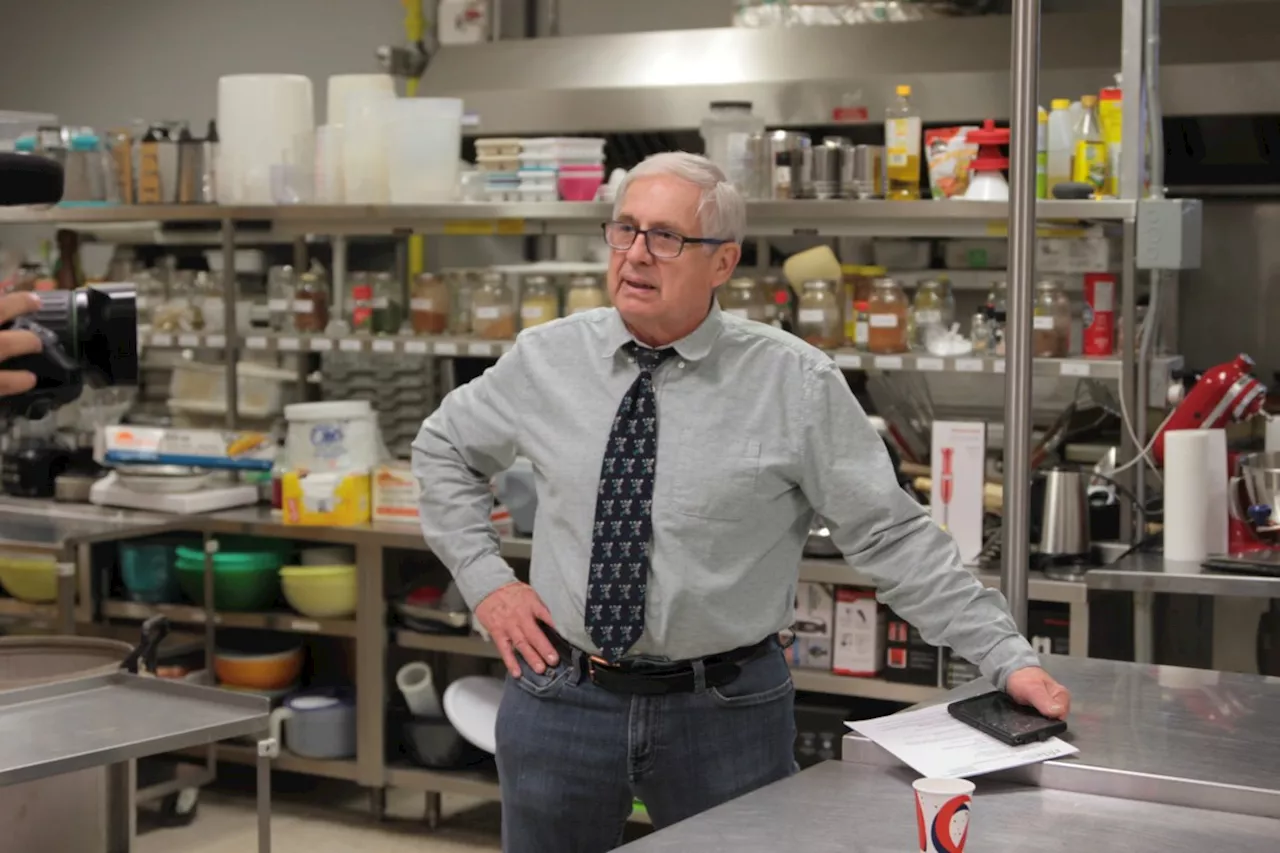Experts warn that US tariffs on Canadian goods could force Canadian food processing and manufacturing to accelerate, but emphasize the need for government support to make this happen. Some companies may consider moving operations south, but the long-term impact remains unclear.
Experts believe that U.S. tariffs on Canadian goods might accelerate the growth of domestic food processing and manufacturing. While some companies are contemplating shifting their operations south, the experts argue that substantial government support is crucial for a genuine transformation. Michael Graydon, the CEO of Food, Health and Consumer Products of Canada, emphasized the need for a comprehensive manufacturing strategy for food in the country.
'Until we actually focus our attention on a strong manufacturing strategy for food in this country, we're just going to continue to try to incentivize people to do things, but not necessarily have a strong plan in place,' he stated. Incoming U.S. president Donald Trump's threat of imposing high tariffs on imports from countries like Canada has sparked concerns about inflation within the U.S. and the potential devastating impact on Canadian agriculture, food companies, and consumers. Canada's food processing and manufacturing capacity has considerably declined in recent decades due to an increased reliance on imported products, according to Graydon. However, following the supply chain disruptions caused by the COVID-19 pandemic and other disruptions, 'I think there is a resurrection of this desire to be more self-sufficient,' he observed. Canada generally enjoys a trade surplus with the U.S. in the food sector, exporting more than it imports, as stated by Tyler McCann, managing director of the Canadian Agri-Food Policy Institute. However, there are certain products where Canada heavily depends on U.S. imports, such as fruits, vegetables, and processed foods like jams, sauces, and snacks. Experts believe these areas present excellent opportunities for bolstering domestic capacity.Evan Fraser, director of the Arrell Food Institute at the University of Guelph, pointed out several 'pushes and pulls' driving interest in reinvesting in domestic operations. Technology is one factor, as Canada now possesses more tools to cultivate fresh produce year-round. On a broader scale, supply chain disruptions and geopolitical tensions are fueling interest in 'nearshoring,' or relocating operations closer to home. Roderick MacRae, a retired associate professor at York University's Faculty of Environmental and Urban Change, agrees that a larger shift is underway, emphasizing the need to rebuild resilience within the domestic food system. 'I think international trade is breaking down,' he stated. Recent investments on Canadian soil include a soy processing facility in Ontario scheduled to open next year, Hershey's return to its Ontario facility vacated in 2007, U.S. company Blommer Chocolate expanding its Ontario site, and an investment by McCain Foods to double the size and output of a processing facility in Alberta. The Canola Council of Canada previously informed The Canadian Press that the industry has been expanding its domestic processing in recent years to mitigate potential trade or supply chain disruptions. More domestic capacity could help stabilize prices on certain items, according to Fraser. However, Graydon cautioned that building that capacity is easier said than done. These costly, multi-year projects require more government support for a genuine shift, not just financial assistance but a 'strong food manufacturing strategy.' In other industry segments with a significant trade surplus with the U.S., tariffs might make companies hesitant to invest further in Canadian operations, said McCann. He explained that the uncertainty could lead to a 'chill on investment in Canadian food processing.' Major companies might delay investing in their current facilities instead of relocating capacity south of the border. However, if tariffs reach 25 percent and remain in place for an extended period, the likelihood of companies moving south increases. McCann agreed that the government should take more proactive measures to prevent this scenario. 'I think we need to see more of a comprehensive approach from the government around how they are going to support those businesses that are at risk of moving to the United States,' he stated. Various business groups this week urged the government to assist Canadian firms in mitigating the harmful effects of potential tariffs and retaliation. Dennis Darby, president and CEO of Canadian Manufacturers and Exporters, noted that businesses are responding to the uncertainty by pausing investment plans or expansion, and he expressed concern that some might relocate production to the U.S. 'We’re already seeing… a bit of a chill on investment and expansion and a chill on hiring,' he said. MacRae suggested that Canadian companies might be apprehensive about Trump's pronouncements but would not make hasty decisions.
CANADIAN FOOD INDUSTRY US TARIFFS DOMESTIC MANUFACTURING FOOD PROCESSING GOVERNMENT SUPPORT SUPPLY CHAIN DISRUPTIONS
Canada Latest News, Canada Headlines
Similar News:You can also read news stories similar to this one that we have collected from other news sources.
 Food and Financial Donations to Thunder Bay Food Bank Down, Organization Faces ChallengesThe Regional Food Distribution Association (RFDA) in Thunder Bay is facing a significant shortfall in donations, with both financial and food contributions down drastically. This shortage threatens the organization's ability to meet the growing demand for food assistance in the region. The RFDA is exploring alternative sourcing strategies, including importing bulk food from across Canada, to bridge the gap.
Food and Financial Donations to Thunder Bay Food Bank Down, Organization Faces ChallengesThe Regional Food Distribution Association (RFDA) in Thunder Bay is facing a significant shortfall in donations, with both financial and food contributions down drastically. This shortage threatens the organization's ability to meet the growing demand for food assistance in the region. The RFDA is exploring alternative sourcing strategies, including importing bulk food from across Canada, to bridge the gap.
Read more »
 Canadian Western Bank Posts Lower Profit Amidst Trucking Industry DownturnCanadian Western Bank reported a lower than expected fourth-quarter profit due to increased provisions for potential loan defaults. The bank attributes the issue partly to declining valuations in the trucking industry, which is expected to impact CWB's finances for the next few years. Despite this, CWB maintains that the recent sale to National Bank of Canada will proceed as planned in early 2024.
Canadian Western Bank Posts Lower Profit Amidst Trucking Industry DownturnCanadian Western Bank reported a lower than expected fourth-quarter profit due to increased provisions for potential loan defaults. The bank attributes the issue partly to declining valuations in the trucking industry, which is expected to impact CWB's finances for the next few years. Despite this, CWB maintains that the recent sale to National Bank of Canada will proceed as planned in early 2024.
Read more »
 The Decline of Canadian Television: Shorter Seasons and Fewer Episodes Worry IndustryThe Canadian television industry is facing a downturn, with shorter seasons, fewer episodes, and increasing cancellations raising concerns about the future. From Prime Video's new series 'The Sticky' with its six half-hour episodes to a decline in overall production, the industry is grappling with financial pressures and a shift toward risk aversion.
The Decline of Canadian Television: Shorter Seasons and Fewer Episodes Worry IndustryThe Canadian television industry is facing a downturn, with shorter seasons, fewer episodes, and increasing cancellations raising concerns about the future. From Prime Video's new series 'The Sticky' with its six half-hour episodes to a decline in overall production, the industry is grappling with financial pressures and a shift toward risk aversion.
Read more »
 No farm, no problem: Young Canadian farmers get their start in the industry in other waysYounger Canadians may not own the farmland or heavy machinery needed to launch traditional agriculture careers, but they are equipped with technology. That’s changing how they get their foot in the door — even when they don’t come from farm families.
No farm, no problem: Young Canadian farmers get their start in the industry in other waysYounger Canadians may not own the farmland or heavy machinery needed to launch traditional agriculture careers, but they are equipped with technology. That’s changing how they get their foot in the door — even when they don’t come from farm families.
Read more »
 Forgotten in the cannabis crash is how the industry is a Canadian success storyLicensed cannabis producers created thousands of new jobs, employing engineers, electricians, surveyors and scientists to meet demand that in 2016 Deloitte estimated would exceed $12-billion a year
Forgotten in the cannabis crash is how the industry is a Canadian success storyLicensed cannabis producers created thousands of new jobs, employing engineers, electricians, surveyors and scientists to meet demand that in 2016 Deloitte estimated would exceed $12-billion a year
Read more »
 Canadian Industry Minister Champagne Weighs in on TikTok Debate, UN Envoy Rae Optimistic About Development GoalsThis article discusses Canada's industry minister's stance on TikTok, the UN's development goals, and other notable news.
Canadian Industry Minister Champagne Weighs in on TikTok Debate, UN Envoy Rae Optimistic About Development GoalsThis article discusses Canada's industry minister's stance on TikTok, the UN's development goals, and other notable news.
Read more »
